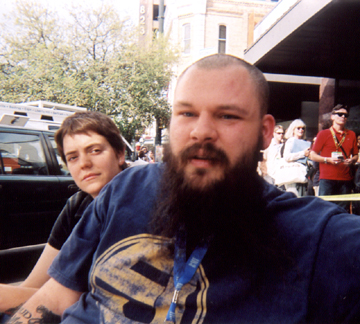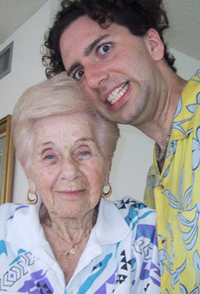 With wife Amy McNutt, local filmmaker James M. Johnston made the trip to Austin for SXSW, but not to see his movie screened.
With wife Amy McNutt, local filmmaker James M. Johnston made the trip to Austin for SXSW, but not to see his movie screened.
|
 Pictured alongside Granny, local computer programmer-slash-’net comedy mogul-in-waiting Robert McKee is big in the Netherlands – for now.
Pictured alongside Granny, local computer programmer-slash-’net comedy mogul-in-waiting Robert McKee is big in the Netherlands – for now.
|
|
A D V E R T I S E M E N T
|
|
|
|
A D V E R T I S E M E N T
|
|
More Cowtown
Fort Worth no-shows again at Austin’s SXSW Film Festival, but who’s at fault?
By KULTUR
Over the past couple of years, the good folks at Austin’s SXSW Film Festival have dedicated a series to Texas-based filmmakers. While Austinites typically predominate on “Lone Star States,” you can count on one hand the number of Fort Worth auteurs who’ve made the cut. But don’t blame South-by and program director Matt Dentler.
“By and large we want to represent Texas as much as we can,” Dentler said. “Right now there’s a huge independent film community in Austin. ... It concerns me because we would hope more filmmakers from [Fort Worth] would want to submit. That would increase their odds.”
Of the 2,800 submissions South-by received from across the globe, 230 were from Austin, 20-plus from Dallas, six from Arlington, and one — count it, uno — from Fort Worth.
Are Cowtown filmmakers just lazy? Untalented? Uninterested? I don’t think so. Though not a lot of films are made here, at least two or three decent ones surface every year, and they’re as good as if not better than some of the “Lone Star States” movies I saw last month. I’d put Monty Griffin’s J-Town and Erik Clapp’s seventy8 up against any current or former entrant in not only “Lone Star States” but in any Texas-centric indie-film series.
I also doubt that aspiring Fort Worth filmmakers haven’t heard of the festival. This year’s installation presented the North American debuts of Robert Altman’s musical A Prairie Home Companion and James Scurlock’s wicked documentary Maxed Out, which takes aim at credit card companies. The event, now 20 years old, also usually attracts mega-wattage, and 2006 was no different. For the dudes, there was Charlize Theron, on hand to promote the Cuban hip-hop doc she financed, East of Havana, and, for the ladies, Texan Matthew McConaughey appeared to be inducted into the Texas Film Hall of Fame.
So the problem doesn’t seem to be lack of concern or effort. No, what I think is troubling us is a serious backbone issue.
“In Fort Worth, I don’t feel the love,” said writer/director James M. Johnston who attended SXSW merely as an observer, not a participant. His submission, Deadroom, the Fort’s lone entry, was rejected. “A lot of people in Fort Worth want to make a film, but they’re completely overwhelmed. He or she doesn’t know where to start or what to do.”
Not so in other big Texas cities. In Austin, for Pete’s sake, the University of Texas Film Institute actually finances independent projects, and as a complement to SXSW and the two or three other film festivals held annually in the capital, the Austin Film Society gladly welcomes the average beginner — if she wants to know what to do with her script or which festivals nationwide are appropriate for her caliber of work, all she has to do is call, write, or drop by. Marquee Hollywood directors Richard Linklater (Before Sunrise) and Robert Rodriguez (Sin City) got their starts in Austin’s fertile filmic soil, and no wonder.
Here, we can’t even compare to our neighbors to the east. Even though Bart Weiss, a film instructor at the University of Texas-Arlington, is in our backyard, he faces the other way. As chief of the Video Association of Dallas, he’s been providing more opportunities to Fort Worth filmmakers than anybody in our area code, simply by inviting them to screen their work. He’s not thoroughly hip to Cowtown’s current situation, but he’s seen a similar dynamic at work in other cities. The prognosis? Negative.
“You can’t build a film community,” he said. “They’re organic.”
Not that Arlington and Dallas teem with philosophers, but Fort Worth, he continued, “is not full of people who like to hang out until 3 a.m. to talk about the existential meaning of life. Eventually things will evolve. Film commissions always ask ‘How can we make all this happen?’ You can’t. You can assist and help and encourage, but you can’t make it happen.”
We do have one relatively formal group, the Lone Star Film Society, but it’s more interested in screening ancient yarns than nurturing a scene. I mean, I love Citizen Kane and The Last Picture Show as much as the next cineaste, but c’mon: If the group’s purpose is to expose young’uns to classic cinema, then tell ‘em to get Netflix or join Blockbuster. Why in the hell anyone — especially a group that calls itself the Lone Star Film Society — would pay for prints of movies that are available in DVD format and at any neighborhood video rental store is beyond me. Why not use that money to, say, help aspiring filmmakers here get started.
“Fascist Watch,” 1919 Hemphill’s series, doesn’t have anything to do with Fort Worth, either. Makes you wonder what happened to the old adage, Think globally, act locally. 1919 folks are more like, Think globally, act globally. (I wonder if any of them even know who their congresspeople are or how to find council chambers.)
Star-Telegram writer Todd Camp (“Q Cinema”) and Dentonite Maria Garcia (“Film Fatale”) both head local alt-cinema events to which no-name filmmakers are encouraged to submit work, but the duo’s admirable efforts still aren’t enough to keep a talent like Johnston from looking to the other side of Ameriquest Field for help.
“The situation in local film is indicative of the entire art scene,” he said. “It all goes back to the people, and they’d rather have a SuperTarget on West Seventh Street.”
Shock Art
Aside from the unexpected preponderance of Kinky Friedman bumper stickers (on cars, on walls, on sale at front desks), Spring Gallery Night was surprisingly full of pleasant, uh, surprises.
For once, the place to be (for good art, not hobnobbing) wasn’t William Campbell Contemporary Art, Artspace 111, or Gallery 414, though all three exhibited superb work (and engendered good hobnobbing). It was the Fort Worth Community Arts Center.
While the center’s main gallery featured Emerson Mayo and Kerrie Conover’s Body/Temple show, which was undone by the tenuous, forced connection between Mayo’s paintings of highway construction and Conover’s photos of tattooed human bodies, the back was a-happenin’. Joshua Smith’s The Suburbs of the Emerald City was made up entirely of shelves of geodes with green crystal interiors, each labeled with a plausible-sounding subdivision name: “Emerald Wells,” “Emerald Pines,” “Emerald Springs,” etc. In the middle of the display sat a much larger geode labeled “Emerald Palasades” [sic] opposite a tiny, untitled geode with a red center. After bathing in Smith’s enviro-spiritual cosmology, simply meandering into the next gallery proved to be a shock. Heather A. Googe’s Krypton consisted of four paintings of realistically rendered, gruesome car crashes in which mangled human bodies all either lie near Superman costumes or wear them. My guard was up when I entered the third and final show, but I was completely blindsided — again. Kelly James and Angela Smalley’s Girls on Ice sparkled with paintings of girls in pink dresses and woodland creatures, all rendered in pastel colors and a-twinkle in glitter. Wow, I needed some boxed wine, and fast.
As always, Artspace 111 ended up being Party Central, especially since it was the near-downtown institution’s 25th birthday celebration. Work from all of the usual suspects crowded the walls, and two pieces in particular truly made me giddy. Or maybe it was the Franzia? Anyway, I never would have guessed their sources had I been unfamiliar with the unique styles on display (or had I not read the accompanying title cards). Anchored by a man in a business suit hanging from the ledge of Mount Rushmore (a handy reference to Alfred Hitchcock’s 1959 thriller North by Northwest), the first intoxicating entry might have gone unremarked if not for its title. “American Dream,” by the normally staid Dennis Blagg, threw into relief anxieties and subtext that weren’t readily apparent. The other shocker was Nancy Lamb’s “Dragonlady,” in which the photorealist stepped out of the upper-crust milieu she loves to satirize and took in a couple of tattooed bikers conversing next to a shiny motorcycle. Unlike most of her signature work, nary a hint of sarcasm corrupted her interplay of ink and chrome.
The logical thing to do after consuming the handiwork of Fort Worth’s best visual artists — and some glorified grape juice — is to go see a student show. Happily, the TCU scholars who put on Dislokated hit more high notes than sour ones. Suspended in a tank of water à la Damien Hirst’s shark in formaldehyde, Jen Dawson’s disintegrating portrait bust was both charming and frightening, sometimes at the same time, while Genie Thompson’s assemblage of photographs inside glass bottles suspended from the ceiling generated the most minute inspection.
Believe you me, I sobered up real quick.
Eating His Words
Last July, local computer programmer Robert McKee was flown to sunny California to be a contestant on the newly resurrected game show Lingo, a wordy brain-teaser hosted by none other than Chuck “See You in Two-and-Two” Woolery. McKee, a longtime Lingo fan from when it first aired back in the late 1980s, would not disclose how he fared. (The episode hasn’t run yet.) But he did admit that his appearance inspired him to create a word game of his own, online.
Though it’s been up for only about a month, www.wordsandwich.com is getting bigger every day — the number of individual plays has quickly risen from 200 to 3,000, according to McKee. The reason? “It’s on, like, every blog that has to do with games or any of that shit,” the 32-year-old explained, oh so eloquently.
Best described by Crosswords to Strain Your Brain author Trip Payne as “The Price is Right’s clock game, but with five-letter words,” Word Sandwich is definitely addictive. (Take my word for it.) European gamers are especially turned on. For contestants in the Netherlands, McKee is working on a fully translated Dutch version. (He’s also received requests for Word Sandwich in German.)
As of now, the site is free and free of advertising.
McKee’s first online game, www.farklepimp.com, went live seven years ago and had a decent, short-lived run but was done in by McKee’s prolific nature. The native Fort Worthian is now looking after 29 other web sites, everything from blogs to games to possibly the greatest piece of satire the cyber-community’s ever seen. Let’s just say that once it launches this summer, it’ll put the Jerky Boys to shame.
Contact Kultur at kultur@fwweekly.com.
 Email this Article...
Email this Article...

